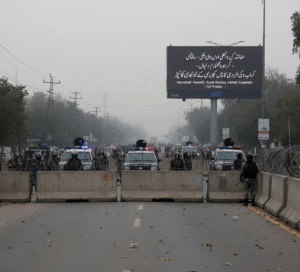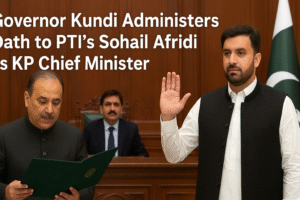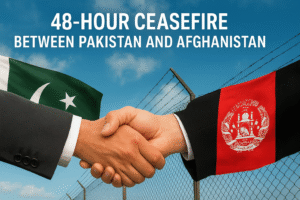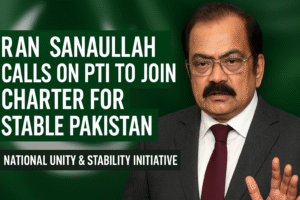Roads Blocked, Internet Suspended in Islamabad & Rawalpindi Ahead of TLP Protest
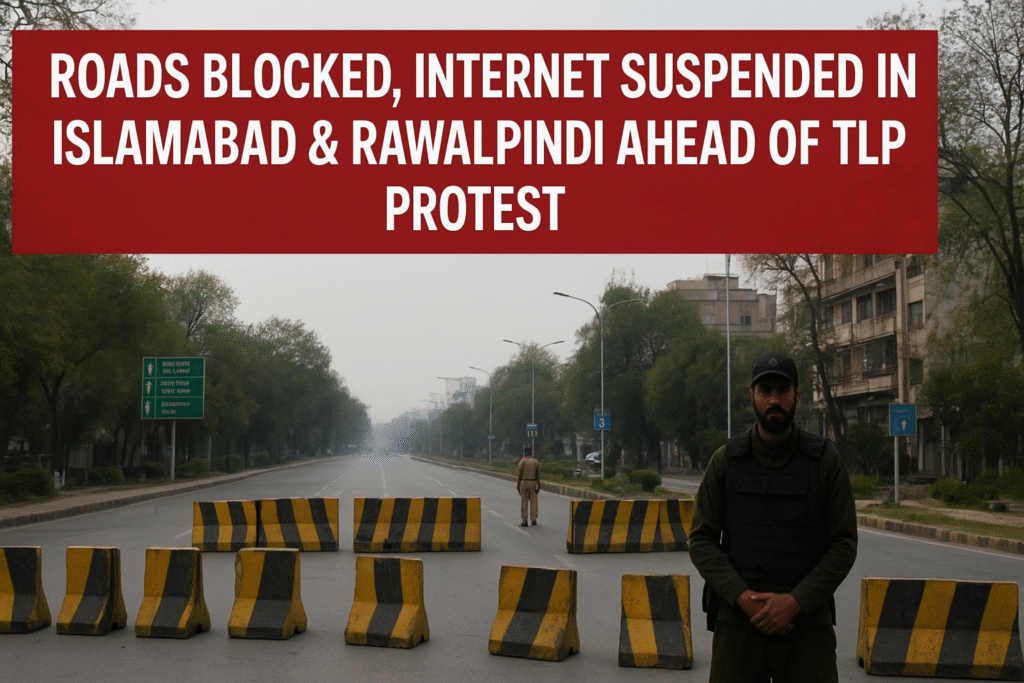
Introduction
In a dramatic escalation of tensions, authorities in Pakistan’s twin cities — Islamabad and Rawalpindi — have imposed widespread security measures, including blocking major roads and suspending mobile internet services, ahead of a planned protest by the Tehreek-e-Labbaik Pakistan (TLP). The move comes amid growing concerns over potential violence, traffic paralysis, and communication breakdowns as the far-right religious party mobilizes supporters for a massive demonstration. Roads Blocked TLP protest Islamabad, mobile internet suspended, Rawalpindi roads blocked, Islamabad police, TLP demonstration, Islamabad protest news, Pakistan law and order.
The federal government, citing security threats and past precedents of violent clashes, has authorized an unprecedented level of preparedness. Commuters, businesses, students, and journalists are bearing the brunt of the restrictions, with many describing the situation as “a lockdown in disguise.”
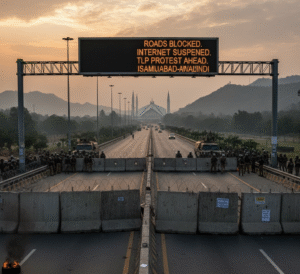
Background: Why the TLP Is Protesting Again
The TLP, known for its hardline stance on blasphemy-related issues, has often clashed with authorities in the past. The current protest was announced following what party leaders describe as the government’s “failure to fulfill commitments” made during previous negotiations.
According to party spokespersons, the protest demands include:
-
The release of detained TLP workers and leaders
-
Implementation of previous agreements between the party and the state
-
Opposition to what TLP calls “blasphemous content” online and in textbooks
-
Greater enforcement of Islamic laws and moral codes in public institutions
The protest was planned in the wake of fresh tensions triggered by online controversies and alleged government inaction. In recent weeks, TLP leaders have used sermons and social media channels to rally supporters from Punjab and other provinces toward Islamabad.
Security Measures in Islamabad and Rawalpindi
Authorities began implementing strict security protocols late Thursday night. Key arteries connecting the twin cities — including Murree Road, Faizabad Interchange, and Srinagar Highway — have been sealed with shipping containers, barbed wire, and heavy police presence.
Officials from the Islamabad Capital Police stated that the restrictions are precautionary and aimed at preventing chaos. Over 5,000 police personnel, including Rangers and Frontier Constabulary (FC) troops, have been deployed at sensitive points.
Key Road Closures
-
Murree Road (from Faizabad to Rawal Chowk) – Completely closed to traffic.
-
Faizabad Interchange – Containers placed on all entry points to Islamabad.
-
Kashmir Highway and IJP Road – Diversions and police checkpoints set up.
-
Metro Bus Service – Temporarily suspended for public safety.
-
Blue Area & D-Chowk – Restricted zones with riot control units on standby.
Motorists have been advised to use alternative routes via Islamabad Expressway or GT Road, though those, too, remain congested due to diversions.
Mobile Internet Suspension and Communication Restrictions
The Pakistan Telecommunication Authority (PTA) confirmed that mobile internet and data services have been suspended in parts of Islamabad and Rawalpindi “until further notice.” The measure, officials say, is designed to prevent the spread of inflammatory content and coordination among protest groups.
As of Friday morning, users reported outages in areas including Faizabad, I-8, I-9, and Saddar, while social media platforms slowed considerably across the region. Journalists and digital businesses voiced frustration over the blackout, warning it could impact online commerce, education, and emergency coordination.
A PTA spokesperson said:
“The temporary suspension of services is necessary for maintaining law and order. Services will be restored once the situation normalizes.”
However, civil rights advocates and internet freedom organizations criticized the move as an overreach, arguing that cutting communication is not a sustainable method of crisis management.
Impact on Daily Life
The combined effect of road closures and internet suspension has paralyzed life in the twin cities.
Commuters Stranded
Thousands of workers and students were stranded for hours as public transport services were disrupted. Ride-hailing apps like Careem and InDriver halted operations in protest-affected zones, leaving commuters walking long distances in scorching heat.
Business and Economic Disruption
Commercial centers such as Blue Area, Saddar, and Raja Bazaar reported significant losses as customers and delivery drivers failed to reach their destinations. Online retailers also experienced sharp revenue drops, as mobile data shutdowns crippled digital transactions.
Educational Institutions
Several schools and universities — including NUST, COMSATS, and NUML — shifted to online classes, but connectivity issues rendered the decision ineffective. Many postponed exams and deadlines, citing safety concerns.
Health Services
Ambulances and healthcare providers faced delays navigating blocked roads. Pharmacies near protest routes remained closed, and hospitals reported staff shortages.
Government’s Justification
The Interior Ministry defended the restrictive measures, citing the government’s responsibility to prevent violence and property damage. A senior official from the ministry said:
“The TLP has a record of disrupting civic life and resorting to aggression. The government cannot risk another round of chaos like in previous years.”
Authorities referred to past incidents — notably the 2017 Faizabad sit-in — when prolonged demonstrations caused national paralysis and led to casualties. Officials fear similar escalation if preventive actions are not taken.
Statements from Law Enforcement
Islamabad Police Chief Syed Ali Nasir Rizvi stated that security personnel have been instructed to act with restraint but will respond decisively if protesters breach designated boundaries.
“Peaceful protest is a constitutional right. However, damaging public or private property, attacking police, or blocking hospitals will not be tolerated.”
He also urged citizens to stay updated through verified government channels and avoid spreading rumors.
TLP’s Response and Mobilization Strategy
In a fiery statement issued late Thursday, TLP Chief Saad Rizvi condemned the government’s actions, calling them “a direct attack on democratic rights and religious freedom.”
Rizvi accused the authorities of “trying to silence the voice of the faithful” and warned that the government would be “responsible for any unrest.”
Despite roadblocks, reports indicate hundreds of supporters traveling on foot or motorcycles toward Islamabad from nearby districts such as Gujranwala, Lahore, and Jhelum. Social media videos showed convoys chanting slogans and waving flags.
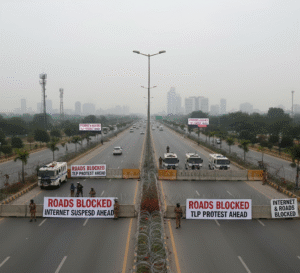
Public Sentiment and Social Media Reactions
Twitter (X), Facebook, and local WhatsApp groups were flooded with mixed reactions:
-
Some users expressed frustration over the inconvenience and poor communication.
-
Others supported the government’s preemptive measures to avoid violence.
-
Civil rights groups demanded restoration of mobile internet, calling the blackout a collective punishment.
Hashtags such as #IslamabadLockdown, #TLPProtest, and #InternetShutdownPK trended nationwide.
History of TLP Protests in Pakistan
The Tehreek-e-Labbaik Pakistan has a long and turbulent history of confrontation with the state:
| Year | Incident | Outcome |
|---|---|---|
| 2017 | Faizabad Sit-in | 21-day blockade; government forced to negotiate. |
| 2020 | Anti-France Protests | Dozens killed; government banned TLP temporarily. |
| 2021 | Lahore Clashes | Violent protests led to deaths of policemen; Saad Rizvi arrested. |
| 2023 | Karachi March | TLP demanded stricter blasphemy enforcement; partial success. |
| 2025 | Current Protest | Tensions revived amid religious and political polarization. |
The repeated cycles of protest and negotiation have created a pattern of political instability, with analysts arguing that TLP’s street power often forces policy compromises.
Expert Analysis
Political analysts and security experts believe the situation underscores Pakistan’s ongoing struggle to balance religious freedom and state authority.
Dr. Huma Baqai, political analyst, noted:
“TLP’s ability to mobilize masses challenges the writ of the state. The government’s approach must shift from reactionary tactics to dialogue and policy reform.”
Analyst Amir Rana added:
“Internet shutdowns and roadblocks only postpone the problem. Pakistan needs long-term deradicalization strategies.”
International Reactions
International human rights watchdogs such as Amnesty International and Reporters Without Borders expressed concern over the communication blackout, urging authorities to respect citizens’ rights to access information.
Foreign missions in Islamabad advised citizens to avoid protest zones and exercise caution.
Economic Implications
Economists warned that frequent protests and shutdowns in the capital region hurt investor confidence and slow economic recovery. Islamabad hosts key government offices, corporate headquarters, and diplomatic enclaves — all dependent on stable infrastructure and communication.
A senior banker told local media:
“Every disruption in Islamabad has ripple effects nationwide. It affects markets, logistics, and confidence.”
Conclusion
As of the latest updates, tension remains high in Islamabad and Rawalpindi. Authorities are maintaining their lockdown-style security posture, while TLP leadership insists it will continue its “peaceful march.” Roads Blocked TLP protest Islamabad, mobile internet suspended, Rawalpindi roads blocked, Islamabad police, TLP demonstration, Islamabad protest news, Pakistan law and order. Roads Blocked TLP protest Islamabad, mobile internet suspended, Rawalpindi roads blocked, Islamabad police, TLP demonstration, Islamabad protest news, Pakistan law and order.
The coming days will determine whether this confrontation remains contained or spirals into another nationwide crisis.
